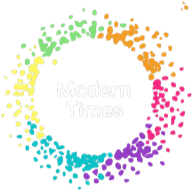 Modern Times would not exist in its present form today if not for Canada’s project of multiculturalism, since this policy led to the creation of diversity-specific funding streams. At the same time, the label of ‘multicultural’ has been very a challenging one for the company. On the one hand, it served to promote the company’s ‘uniqueness’ in the context of a Canadian theatre scene that in the 90s was still fairly white Canadian.
Modern Times would not exist in its present form today if not for Canada’s project of multiculturalism, since this policy led to the creation of diversity-specific funding streams. At the same time, the label of ‘multicultural’ has been very a challenging one for the company. On the one hand, it served to promote the company’s ‘uniqueness’ in the context of a Canadian theatre scene that in the 90s was still fairly white Canadian.
At the time, we were bringing original Persian dramas to Toronto audiences in a theatrical style that didn’t resemble what was on stages at the time; on the other hand, being a ‘multicultural company’, a ‘culturally-diverse company’, or even an ‘intercultural’ theatre company” felt destructive to us when it ignored the real artistic innovation we were attempting to contribute to the artistic community and instead placed emphasis on the exoticness of the work.
The fact that we do not hesitate to work with actors who have ‘different’ accents and that our productions are without specific time or locale (which makes casting from diverse cultures easier) suggest that we would like to see Canadian theatre audiences and theatre practitioners change their ideas about what they need to see on stage in order to recognize themselves. This applies both to culturally-diverse communities and so-called founding nations. A culturally-diverse member of our casts does not represent his race or culture on the stage; instead, he represents his unique individuality as an artist and human being. We aren’t emphasizing the predominance of different cultural identities in the world, but are simply saying that this, in its ensemble, is the human race we represent, which is both beautiful and vulnerable.
We believe that we can all simultaneously represent several different or plural identities. Our production of ‘Hallaj’ in 2011, for example, challenged the illusion of a unique, singular and choiceless identity. We are not against identity—we are aware that it can be a source of pride, joy, strength and confidence for people. And yet, we recognize that identity can cause destruction and death. We continue to see violence associated with identity conflicts repeating itself around the world and taking millions of lives. So when we bring signs of world culture into the work or when we assemble culturally-diverse casts, we are simply acknowledging the existence of the globalized world, the hallmark of our generation. These are the modern times in Modern Times.
